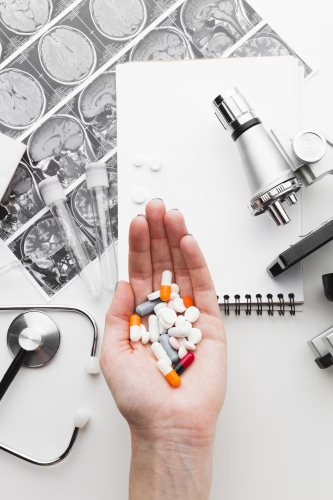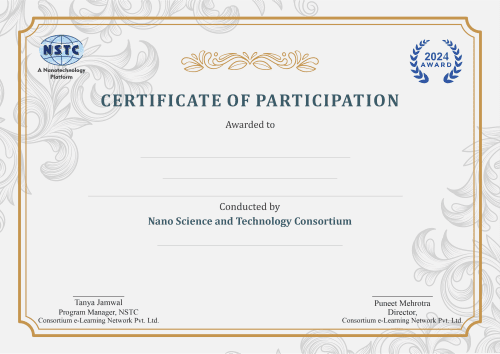
Pharmacovigilance in Ensuring Drug Safety and Patient Welfare
Pharmacovigilance: Protecting Patients, Ensuring Safe Medicines
Skills you will gain:
About Program:
Pharmacovigilance in Ensuring Drug Safety and Patient Welfare is a critical resource for healthcare and pharmaceutical professionals, focusing on effective pharmacovigilance practices to detect, assess, and prevent adverse drug effects, thereby enhancing patient safety and ensuring compliance with global regulatory standards.
Aim: The aim of this guide is to empower healthcare and pharmaceutical professionals with advanced pharmacovigilance skills, enhancing their ability to monitor, analyze, and report adverse drug reactions. This knowledge ensures higher drug safety standards, better patient outcomes, and compliance with regulatory requirements, fostering a safer healthcare environment
Program Objectives:
- Understand Pharmacovigilance Principles: Gain a deep understanding of the fundamental principles of pharmacovigilance, including its scope and significance in healthcare.
- Enhance Drug Safety Monitoring: Learn techniques for effectively monitoring and reporting adverse drug reactions to improve drug safety.
- Promote Patient Safety: Emphasize the implementation of strategies that ensure patient safety and minimize risks associated with medication use.
- Support Regulatory Compliance: Provide knowledge on current regulatory requirements and how to comply with them to ensure the efficacy and safety of drugs.
What you will learn?
Day 1 :
Session 1: Introduction to Pharmacovigilance
● Overview and Importance of Pharmacovigilance
○ Definition and objectives
○ Importance in ensuring drug safety and patient welfare
Session 2: Adverse Drug Reactions (ADRs)
● Definition, Classification, Identification, Assessment, and Reporting of ADRs
○ Types of ADRs
○ Methods for identification and assessment
○ Reporting mechanisms and regulatory requirements
Session 3: Tools and Techniques for ADR Detection and Signal Management
● Tools and methodologies for ADR detection
● Signal management principles and techniques
● Case Studies: Analyzing and managing safety signals
Day 2:
Session 4: Pharmacovigilance in Clinical Trials
● Role of Pharmacovigilance in Clinical Trial Safety Monitoring
○ Adverse event reporting in clinical trials
○ Risk management strategies and minimization measures
● Pharmacovigilance Planning and Risk Management Plans
Session 5: Signal Detection and Risk Management
● Principles of Signal Detection and Signal Management
○ Tools and methodologies for signal detection and assessment
○ Case Studies: Analyzing and managing safety signals
Session 6: Pharmacovigilance Audits, Inspections, and Special Populations
- Overview of Pharmacovigilance Audits and Inspections
● Pharmacovigilance Considerations in Special Populations
Day 3:
Session 7: Recent Advancements in Pharmacovigilance
- Overview of Recent Advancements
○ Real-world evidence and big data analytics
○ Artificial intelligence and machine learning applications
○ Integration of electronic health records (EHRs) and patient-reported outcomes
○ Global pharmacovigilance harmonization efforts
Session 8: Communication and Reporting
- Effective Communication of Drug Safety Information
○ To healthcare professionals and the public
● Practical Exercises: Preparing Pharmacovigilance Reports and Communication
Materials
Session 9: Future of Pharmacovigilance - Digital Pharmacovigilance and the Role of Artificial Intelligence
● Discussion on Future Challenges and Opportunities in Pharmacovigilance
Mentor Profile
Fee Plan
Get an e-Certificate of Participation!

Intended For :
- Students: Undergraduate and graduate students in pharmacy, medicine, and health sciences interested in drug safety and pharmacovigilance.
- PhD Scholars: Researchers studying drug interactions, adverse effects, or any pharmacological aspects that directly impact patient care.
- Academicians: Faculty members teaching pharmacology, clinical medicine, or pharmacy who integrate pharmacovigilance into their curriculum.
- Industry Professionals: Healthcare professionals, regulatory affairs specialists, and pharmaceutical industry personnel involved in drug safety monitoring.
Career Supporting Skills
Program Outcomes
- Adverse Drug Reaction Identification: Ability to identify and understand the mechanisms of adverse drug reactions.
- Data Analysis Skills: Proficiency in analyzing pharmacovigilance data to discern patterns that indicate potential safety issues.
- Reporting and Communication: Skills in accurately documenting and reporting adverse effects as per regulatory standards.
- Risk Management: Capability to develop and implement risk management strategies in clinical and pharmaceutical settings.
